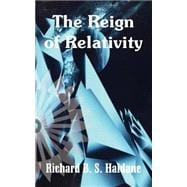| PART I-THE PROBLEM OF RELATIVITY | |||||
|
|||||
|
3 | (13) | |||
|
|||||
|
16 | (17) | |||
|
|||||
|
33 | (18) | |||
|
|||||
|
51 | (31) | |||
|
|||||
|
82 | (41) | |||
|
|||||
|
123 | (26) | |||
| PART II-THE METAPHYSICAL FOUNDATION OF RELATIVITY | |||||
|
|||||
|
149 | (24) | |||
|
|||||
|
173 | (20) | |||
|
|||||
|
193 | (27) | |||
|
|||||
|
220 | (23) | |||
| PART III-OTHER VIEWS ABOUT THE NATURE OF THE REAL | |||||
|
|||||
|
243 | (22) | |||
|
|||||
|
265 | (27) | |||
|
|||||
|
292 | (25) | |||
|
|||||
|
317 | (16) | |||
|
|||||
|
333 | (18) | |||
| PART IV-THE INDIVIDUAL AND HIS ENVIRONMENT | |||||
|
|||||
|
351 | (16) | |||
|
|||||
|
367 | (18) | |||
| PART V-THE HUMAN AND THE DIVINE | |||||
|
|||||
|
385 | (20) | |||
|
|||||
|
405 | (16) | |||
|
|||||
|
421 | (11) | |||
| INDEX | 432 |








